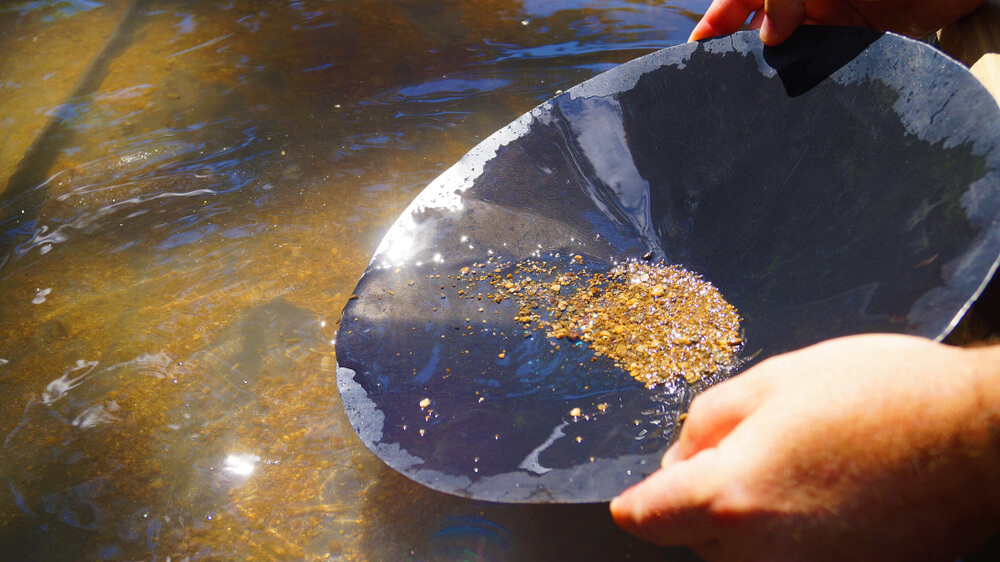
Is Home Storage Gold IRA Legal?
As humans, we have this tendency to hold on to all precious and invaluable things (physical or intangible). For instance, we like to stay as physically close as possible to our family and friends. Moving away from them, even if it is for everybody’s good, is often a hard pill to swallow.
We like to keep physical possession of goods, particularly the more monetarily valuable ones. People setting up garages for their cars are a manifestation of that deep-seated emotion. However, at times, It’s best to let go of direct physical control of things for safety, peace, and sanity.

It's okay to store gold in your house if you’re not having hordes of them. But if you own gold or any other precious metals worth several thousand dollars, it’s not wise to take the onus of their protection onto yourself. And if it is gold bought for retirement savings or under a gold IRA retirement account, storing the valuable metal in a proper depository and not a home storage space becomes mandatory.
Does that mean home storage gold IRAs are illegal? No, home storage IRAs aren’t against the law. But a gold IRA requires the gold bought under the account is stored in an IRS-approved repository. In this article, we’ll discuss:
- Is holding IRA gold at home an option?
- Why do some people like to keep their IRA gold with them?
- Why home storage gold IRAs are a terrible idea?
- Things some companies and owners do to sidestep IRS rules, and more
If you’re considering home storage gold IRAs, read this article first.
Table of Contents
Can You Store IRA Gold in Your Home?
Storing gold in your house is not illegal or against the law, provided the IRS is aware. But you cannot keep the gold you bought under an IRA arrangement in your home or any facility that is not an IRS-approved nonbank trustee corporation.
Gold belonging to an IRA is usually meant to be safeguarded in a highly secured depository. Even the account owner cannot see or inspect their gold once it’s locked inside a repository. They must get permission from their custodian to check on their physical gold bullion coins or bars.
If you choose to keep IRA gold in your house and the IRS knows about it, the federal revenue service agency will impose taxes on the purchase and penalize you for the act.
Not to mention, storing gold or any other precious metal under a self-directed IRA arrangement without the knowledge of the IRS or against IRS regulations will harm your retirement account’s standing in the long run.
Read more: Gold IRA Depositories
Why Do Some People Prefer Storing IRA Gold in Their Home?
Gold bought under an IRA goes to a depository. It charges a flat fee or percentage of the cost of total gold stored. If you keep the gold separate from other precious metals in a gold IRA repository, you must pay extra.
Although these costs are marginal compared to the invaluable service offered, some gold IRA account holders want to save up even on that by relegating their IRA gold to the safety deposit boxes confined to their own homes.
For some retirement account owners, the thought of storing their precious retirement assets outside doesn’t sit well, primarily because they do not trust depositories or any other state-regulated entity. If something untoward happens, they would not want their tangible assets to be confiscated or locked until the situation (whatever it is) gets better.
But contrary to some people’s preemptive thinking, the storage situation with depositories is nowhere close to being that precarious or dicey. In fact, if retirement account holders tried to learn more about gold IRAs and depositories, their doubts about gold IRA storage would immediately vanish. They would, in fact, not want to store gold in their homes again.
Why Should You Not Store IRA Gold in Your House?
First, the IRS will not recognize home storage gold as bought under a self-directed IRA. Not to mention, the gold will lose its tax-deferred status or will be subject to immediate taxation. And then there a host of other concerns.
Burglary
Besides the unlawful nature of storing IRA gold at home, there’s the risk of theft and damage. The level of security your home storage space or safe offers will never come close to the robust safety net provided by an IRS-approved depository vault. Even a bank safety deposit box is safer than your personal storage space.
Gold and other precious metals are usually delivered to a repository from the dealer in armored cars. The multi-redundant security measures of a depository also render the space extraordinarily safe and secure.
However, the multiple layers of security do not alienate you from your precious belongings. Depositories have tools to provide account owners unlimited online access to pertinent and current data about their assets. Professional storage spaces also conduct independent third-party audits, which confirm essential information about the account.
Lack of Storage Space
The home-based storage facility may not be roomy or insulated enough. If it’s not corrosion-free and waterproof, your precious metals may get damaged and a hit in their value. If the gold is stored with other precious items, it may tarnish. Certain highly refined bullion items, such as proof coins, are easy to scratch.
Talking about space again, the biggest draw with a depository is its ability to store large amounts of valuable holdings. That means there’s always enough room for your gold, even if its footprint continually increases. Also, most repositories have storage facilities in multiple locations—even outside the country in places like London, Hong Kong, Zurich, etc.
In short, a gold IRA depository affords secure, insured bullion vaults and sound political and geographic diversification for your IRA assets.
Contents Insurance May Be Lacking
If you have gold insurance, it may cover the costs attached to repairing and salvaging your gold articles but only to a certain extent. Also, do not discount the back-and-forth game you may end up playing with your insurance company to recover your losses. And if you didn’t insure your gold belongings at all, you’re in much bigger financial trouble.
Note: Home content insurance will only marginally cover gold damage or theft.
Comparatively, a depository’s corporate insurance cover is all-encompassing and also worth millions of dollars, which means full protection for your gold and beyond.
Liquidity Issues
You can either withdraw your gold from an IRS-approved depository or get an equivalent amount of cash in return at distribution. If you receive the physical gold, selling it for its spot price will be easy since the IRA tag automatically qualifies the precious metal as pure, pristine, and valuable.
Gold bullion coins, such as the American Eagle coin, have so much visibility and clout among coin collectors and dealers that they are almost inherently liquid or fungible.
You may sell your IRA assets anytime and have the sales proceeds wired to you within a few hours or the same day, irrespective of your gold’s geographic location. However, the transaction will require a nod from your custodian, which may cause some delay.
Most importantly, you’ll not have to ship and transport the sold physical metals. The precious metals dealer, depository, and custodian will work in unison to see the transaction through.
If you were to store the gold in a home storage environment instead, the gold would fall out of an IRA’s ambit, meaning the quality and purity of the pieces aren’t guaranteed. The jeweler or precious metals dealer you’d like to sell the gold to will check for the piece’s authenticity or its actual gold content, which could be a multi-step, long-drawn process that could also cost some money. Also, vigorous testing may damage the gold’s aesthetics and integrity, impacting its market price.
If you are convinced (which you should be) that a depository is the safest place for your gold IRA assets to reside and would like to know more about gold IRA depositories, click on the link.
The Marketing Push Behind Home Storage Gold IRA

If you thought storing gold belonging to an IRA in the safe deposit box of your house is okay, the thought may have stemmed from the plethora of companies advertising and claiming people can buy tax-free gold under an IRA and store the gold owned in their homes. And that is despite the IRS sternly warning against the same.
Quite a few companies are guilty of promulgating such false information indirectly. These companies are pretty aware their claims are grey areas and, therefore, put a disclaimer in their ads that states their statements mustn’t be considered legal advice or exercised without expert advice.
Some firms showcase attorney letters or recommendations claiming support for home storage for gold under an IRA. Be aware that those letters are mere opinions and do not establish a working relationship between those lawyers and people buying gold under an IRA or other retirement accounts.
IRS rules are not very clear on the matter. They haven’t categorically taken up the issue of home storage gold IRAs or commented on the legality of those precious metals IRA structures. Therefore, some gold IRA companies openly advertise such home storage IRA arrangements without impunity.
Setting Up an LLC to Store IRA Gold at Home
Some IRA owners set up a limited liability company to store IRA gold on their premises. Although the arrangement is not illegal or doesn’t run afoul of IRA rules, the owner of the retirement account must prove in or outside the court to the IRS that they did not monetarily benefit from the precious metals. Most importantly, the LLC must own the home storage box.
Currently, the courts permit LLCs owned by IRAs but using the strategy to own precious metals and put the gold belonging to an IRA under home storage has not been taken up before.
Due to the lack of experience handling retirement funds or zero verifiable fiduciary experience, most people who store gold owned by them in their homes invariably fall flat with the execution.
However, the shortcomings above haven’t prevented IRA account hold owners from taking the LLC route. And some companies are helping set up such quasi companies charging a few hundred to more than a thousand dollars for every incorporation.
Read more: Best gold IRA companies
Conclusion
To conclude, home storage gold IRA is not illegal, but it’s not worth the hassle and loss of mental peace attached to storing gold in a non-secure place. Moreover, the gold IRA arrangement would cease to exist if the gold belonging to an IRA is stored in the IRA owner’s own home.
Irrespective of the level of security measures in place, a home storage space for gold will never be able to compete with a depository that has paid employees and state-of-the-art infrastructure safeguarding precious metals owned by multiple patrons.
A proper storage space, like a repository, becomes even more crucial when dealing with large quantities of precious physical metals. Home storage spaces usually cannot handle valuable metals en masse. Based on the area available, there may not be enough physical space to accommodate all that gold, much less accord a proper storage environment.
Long story short, always store gold bought in relation to a gold IRA in IRS-approved storage spaces. Do not amass your IRA purchases in your house and turn the account into a home storage gold IRA or your own IRA.
FAQs
Can I store my IRA gold in a bank vault?
No, you cannot buy physical gold for an IRA and store it in a bank vault. It’s simply against IRA statutes.
Bank vaults are not safe and secure enough to accommodate self-directed IRAs. Most critically, not all are FDIC-insured. Banks without the FDIC (Federal Deposit Insurance Corporation) insurance do not protect against theft, natural calamities, wars, etc.
Banks usually do not protect a safe deposit box’s contents with an insurance cover. Also, FDIC insurance is generally pretty limited with its coverage of the insurance sum and the types of accounts it covers.
Another reason bank vaults are out of the question is they may not be big enough if you want storage space for a significant number of coins. Since banks do many other things than just safeguarding valuable items, they do not or cannot set up spacious storage spaces for tangibles.


